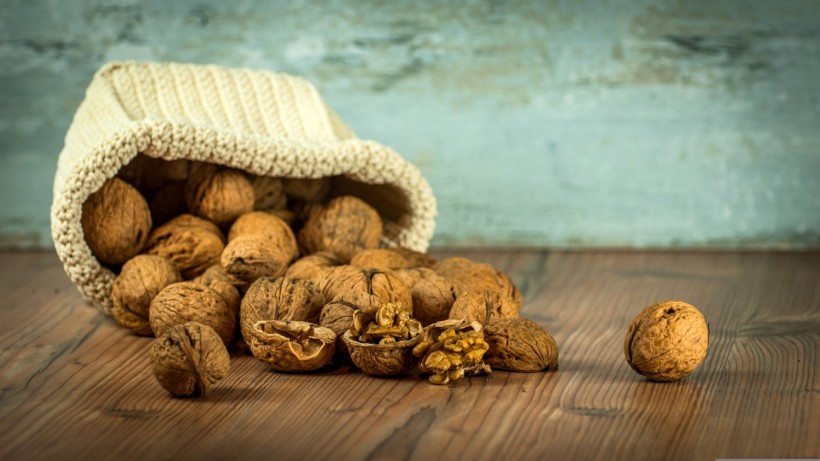University of Chicago researchers made a significant discovery regarding a potential treatment that could reverse a person's food allergies. The study, published in MDPI, concentrated on the gut microbiome, which has been investigated as a potential link to food allergies.

Walnuts Spill Table
Gut Microbiome
According to Medical News Today, the gut microbiome is the composition of microorganisms that coexist naturally in our intestinal tract. In a 2019 study, it showed that people with food allergies have altered gut microbiomes, which have been shown to help these allergies develop.
Important microbes may disappear when the balance of gut bacteria is disturbed, a condition known as dysbiosis.
Dr. Rosamond Rhodes, professor of medical education and director of bioethics education at the Icahn School of Medicine at Mount Sinai, said that research on the human microbiome has revealed that humans coexist with millions of bacteria and that we are not just us by ourselves. Instead, we are a combination of us and them.
Clostridia Microbe Linked to Food Allergies
According to Health Digest, clostridia is one of these microbes that has been linked to food allergies. Along with other diseases and conditions, the bacteria are linked to inflammatory bowel disease.
The metabolite butyrate, which is produced by Clostridia, encourages the development of beneficial bacteria and aids in maintaining the balance of the microbiome. Additionally, it aids in maintaining the integrity of the gut's lining by preventing food from escaping and possibly triggering an allergic reaction in the intestinal mucosa.
Butyrate Introduced Into the Gut May Stop Pre-Existing Allergies
Attempts to restore Clostridia to the microbiome orally or via fecal implants have not worked out so a team of researchers from the University of Chicago, Illinois, decided to try to introduce butyrate itself into the gut.
The researchers report that ingested butyrate prevented food allergies in mice and even stopped pre-existing allergies.
Butyrate wrapped in polymer was administered directly to the mice by the researchers. It tastes bad and has a very unpleasant smell, similar to that of rotten butter and dog poop. As a result, people would not want to consume it.
The butyrate was polymerized with butanoyloxyethyl methacrylamide, methacrylic acid, and hydroxypropyl methacrylamide by the researchers. Polymeric micelles are self-assembling chemical aggregates that the researchers refer to. The butyrate ended up concealed inside the micelles, along with its unpleasant flavor and odor.
Following ingestion, stomach acid starts to dissolve the micelles, allowing the butyrate to enter the lower gut well below taste or olfactory receptors as the aggregate disintegrates.
ALSO READ: Chestnuts Roasting On A Deadly Food Allergy
Treatment Can Be Used To Treat Different Allergies
Butyrate, according to the researchers, also stopped the mice's anaphylactic reaction to peanuts. One of the most dangerous allergens for people is peanuts.
This kind of treatment is not antigen-specific. Therefore, theoretically, by modifying gut health, it can be broadly applied to any food allergy.
In the future, researchers envision a person with a food allergy being able to take a small packet of polymerized micelles that contain butyrate, mix it with water or juice, and drink it.
RELATED ARTICLE: Fecal Transplant Pills a Potential Food Allergy Treatment for People Allergic to Peanuts Based on Clinical Trial Results
Check out more news and information on Medicine and Health in Science Times.



![Earth's Quasi-Moon Kamo‘oalewa Could Originate From Lunar Surface Not Asteroid Belt [Study]](https://1721181113.rsc.cdn77.org/data/thumbs/full/53275/89/56/50/40/earths-quasi-moon-kamo-oalewa-could-originate-from-lunar-surface-not-asteroid-belt-study.png)










